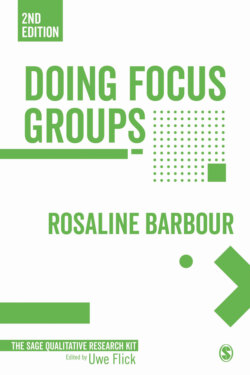Читать книгу Doing Focus Groups - Rosaline Barbour - Страница 19
На сайте Литреса книга снята с продажи.
Broaching difficult or ‘sensitive’ topics
ОглавлениеFocus groups – and, in particular the permission afforded by the group setting and ‘safety in numbers’ – have also frequently been employed by researchers in order to talk with participants about potentially delicate topics, such as end-of-life care for the terminally ill (Seymour et al., 2002); involvement of families in organ donation (Regan, 2003); children’s experiences of cyber-bullying (Mishna et al., 2009); or perspectives of parents of seriously ill children with respect to advance directives (Boss et al., 2015). In such instances multiple advantages of focus groups have sometimes been drawn upon, such as in the work of Alkhawari et al. (2005), who researched the views of UK Muslim Indo-Asians with regard to transplantation, and who cite the dual capacity of focus groups to reach a specific sector of the population and to broach a sensitive topic. Some such focus group projects have provided insights that are potentially valuable for service providers and an example is provided by de Vries et al. (2014), who looked at how breast cancer survivors cope with fear of recurrence. These nuanced findings can, for example, alert professionals to oversights with regard to how services have been provided in the past.
Some commentators have argued that focus groups are not suitable for eliciting experiences with regard to sensitive topics, and have asserted that one-to-one interviews are more appropriate. However, this assumption is questionable. As Farquhar and Das (1999) point out, the sensitivity of a topic is not fixed – rather it is socially constructed with one person’s or group’s ‘no-go area’ being perfectly acceptable for another. In weighing up options, the researcher is well-advised to consider the wider context in which the focus group discussions are being held. De Oliveira (2011) who carried out focus groups about perceptions of sexual risks with adolescent girls in Southern Brazil explains:
Focus group research about views on sexual risks can also be considered as ‘sensitive’ because to talk about ‘risk-taking’ may involve the disclosure of perceived moral failures. The negativity of risk-taking is originated in the contemporary emphasis on the moral accountability for personal welfare. (2011, online)
This observation about the sociocultural nature of ‘risk’ led de Oliveira to convene groups with girls who shared a similar sociocultural context.
Despite the scepticism of some researchers, focus groups have been used by many researchers to address topics considered ‘sensitive’ in a wide range of ‘difficult’ situations with groups viewed as potentially vulnerable. Focus groups have proved to be a mainstay of research into sexual behaviour (Frith, 2000), often utilizing pre-acquainted groups, as did de Oliveira. Other studies which have focused on sexual behaviour include Flynn et al. (2011) who looked at sexual functioning and cancer; and Klaeson et al. (2011) who talked with women about the impact of breast cancer on their sexuality. Rather than simply documenting attitudes or experiences such work has often provided detailed and nuanced accounts, such as did the study by Davis et al. (2014) into heterosexual men’s condom use and their explanations of their strategies of resistance. In contrast to one-to-one interviews, which excel at eliciting personal narratives, focus groups allow researchers to look at more subtle, but potentially highly relevant understandings and behaviours.
